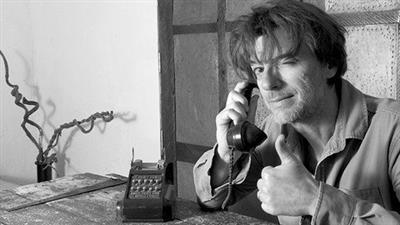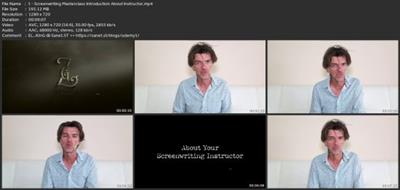Published 12/2022
MP4 | Video: h264, 1280x720 | Audio: AAC, 44.1 KHz
Language: English | Size: 2.44 GB | Duration: 2h 15m
Modern Spec Script Industry Standard Formatting & Bonus Film Lessons
What you'll learn
The difference between a "spec script" (speculative screenplay) and a "shooting script"
The differences between a documentary and fictional works that resemble nonfictional stories
The important elements that separate a Feature Film (or Short) from a TV Series
Essential screenplay software tools and techniques to get you started
Modern Industry Standard Screenplay Formatting Practices
How to write a Title Page & what goes on it
Best practices for screenwriters who offer a spec script to a director to read
Techniques that will improve your screenplay formatting & readability
Copyright and Intellectual Property guidelines and practices
Pitching realities and methods
Structure and other workflows, and much more!
Requirements
No screenwriting or film production experience required.
To make the most out of this course, please use screenwriting software. Some free options will be listed in this course to get you started!
Description
If you're trying to make sense of what style of formatting goes into a screenplay, especially the important Spec Script (Speculative Screenplay), because EVERY screenplay you read looks different, this comprehensive and up-to-date Screenwriting Masterclass is for you!Taking a holistic approach to the art of screenwriting builds confidence, because it informs you of what your work looks like to other film professionals. This industry can be a confusing labyrinth of misinformation and constant "rule" changes. I'm here to help you master the grey areas of screenwriting industry formatting, and much more.Like a drummer who holds the beat for an audio track, the screenwriter is in the background of the film industry with a crucial job to do. Screenwriters are team players, and screen industry professionals depend on them to keep the show alive and propel other crew members into full production mode.It is important for a screenwriter to let other creatives do their job, and not be overly consumed with detailed instructions of how a screenplay should be technically filmed. A screenwriter is a visionary who needs to trust the process of industry screenplay formatting standards, including areas of choice rather than "must".When I started film school as a student many years ago, I wrote screenplays just like the novels I wrote. Explaining this and that without considering the tools in front of me in the screenwriting software, and not using them to my advantage to enhance the script reading experience.My lecturer used my work as an example of what NOT to do in class, but that quickly changed when I squeezed out all the misinformation that was floating around in this industry (and my head). I was given top marks for my new performance, once I realised that I was only one part of the storytelling ensemble.This was one of my first lessons in becoming aware of screenwriting disciplines, as compared to writing novels.It is only natural that screenwriters begin their journey by drumming to their own beat. Eventually, we realise that the style is not recognised in the film industry, nor is it respected or appreciated amongst the stakeholders.In this screenwriting masterclass, you'll learn more than formatting standards. Hopefully, you'll discover something about yourself and the creative visionary that lives inside you. The one who deserves to be heard and taken seriously.By the end of this screenwriting course:You will confidently move forward in screenplay formatting styleYou will distinguish the differences between a fictional work and an actual documentaryYou will utilise the tools in screenwriting software for a faster and more productive workflowYou will have the ability to work within the discipline of Industry Screenplay StandardsYou will have the confidence to tackle other areas of screenwriting formatting stylesYou will know what documentation is required for pitchingYou will be able to start writing a Pilot Episode for a SeriesYou will find the best fit for your creative style and much more!
Overview
Section 1: Personal Introduction to Course
Lecture 1 Screenwriting Masterclass Introduction & About Instructor
Section 2: Industry Standard Formatting
Lecture 2 Screenwriting Software
Lecture 3 Page Size & Typography
Lecture 4 Fictional vs Documentary Style & Variations
Lecture 5 Writing For TV
Lecture 6 Scene Headings (aka Sluglines) Introduction
Lecture 7 Master Scene Headings - Camera Location
Lecture 8 Master Scene Headings - Shooting Location
Lecture 9 Master Scene Headings - Time of Day
Lecture 10 Master Scene Headings Extensions
Lecture 11 Master Scene Headings_Other Styles
Lecture 12 Changing Formatting Rules
Lecture 13 "FADE IN:" - Is it still a thing?
Lecture 14 Superimpose (aka Super) and Other Digital Information
Lecture 15 Action Lines with Flashback Example
Lecture 16 Action Lines - Character Introductions
Lecture 17 Characters, Sounds & Props Within Action
Lecture 18 Special Notes & Informing the Reader Guidelines
Lecture 19 Directing the Camera in a Script to Important Information
Lecture 20 Formatting Passages of Time Within a Scene
Lecture 21 Following the Action Within a Scene to Other Locations
Lecture 22 Character Names & Extensions
Lecture 23 Character Name Extensions - (CONT'D), (O.S), (V.O.) & More
Lecture 24 Character Names Extensions - Telephone, TV & Other Situations
Lecture 25 Parenthetical Tool (aka Wryly)
Lecture 26 Scripting Animals & Children
Lecture 27 Dialogue Tool
Lecture 28 Chyrons (Speech Bubbles and Phone Text)
Lecture 29 Beats and Formulas
Lecture 30 "White Space" - Scripts Are Not Novels
Lecture 31 Writing Conventions - Spelling, Punctuation and Style
Lecture 32 Transititions
Lecture 33 "FLASHBACK" & "MONTAGE" - Applications and Formatting
Lecture 34 Ending a Screenplay and Credits
Lecture 35 TITLE PAGE - What goes on it?
Lecture 36 Save and Back Up
Section 3: Protecting Your Work
Lecture 37 Copyright, Intellectual Property, NDA & Housekeeping
Section 4: Loglines, Synopses, TV Series Bibles
Lecture 38 Concept, Logline & Synopsis
Lecture 39 TV Series Bible
Lecture 40 Mise-en-scene, Genre & Tone
Section 5: Story Structure
Lecture 41 3-Act Structure
Lecture 42 Subplots & Narrative Structure
Lecture 43 Character Driven vs Plot Driven, Plus Eye Candy
Section 6: Responsibilities of Being a Creative Visionary & Further Development
Lecture 44 Ethics and Industry Responsibilities
Lecture 45 Closing Words & Your Next Move as a Cinematic Visionary
Storytellers of any field,Filmmakers who need to level-up,Authors who want to write screenplays,Screenwriters who need more clarity about the modern approach to formatting,Creatives who want to pitch their film or TV concept to buyers or crew,Students of film or acting who need extra guidance and support
Download link
rapidgator.net:
uploadgig.com:Kod:https://rapidgator.net/file/754be92e377b12124fc08978e6c9c5bb/mkugw.Screenwriting.Masterclass.2022.part1.rar.html https://rapidgator.net/file/c27296153b7ae324ee5ac0a6d6cf50db/mkugw.Screenwriting.Masterclass.2022.part2.rar.html https://rapidgator.net/file/d3f5a13e588cb4c02ab068abc7e655fc/mkugw.Screenwriting.Masterclass.2022.part3.rar.html
nitroflare.com:Kod:https://uploadgig.com/file/download/da63b05f4e79d5fE/mkugw.Screenwriting.Masterclass.2022.part1.rar https://uploadgig.com/file/download/c817f9e379418fcd/mkugw.Screenwriting.Masterclass.2022.part2.rar https://uploadgig.com/file/download/Bb81D782eb98bfcd/mkugw.Screenwriting.Masterclass.2022.part3.rar
1dl.net:Kod:https://nitroflare.com/view/AD20186F5459790/mkugw.Screenwriting.Masterclass.2022.part1.rar https://nitroflare.com/view/16C450B1271FDE7/mkugw.Screenwriting.Masterclass.2022.part2.rar https://nitroflare.com/view/A1964CF11868A7F/mkugw.Screenwriting.Masterclass.2022.part3.rar
Kod:https://1dl.net/jnb7n6e3c4iv/mkugw.Screenwriting.Masterclass.2022.part1.rar https://1dl.net/bzj123jp3ml8/mkugw.Screenwriting.Masterclass.2022.part2.rar https://1dl.net/ejbl1c5q6kl8/mkugw.Screenwriting.Masterclass.2022.part3.rar
1 sonuçtan 1 ile 1 arası
-
23.12.2022 #1Üye



- Üyelik tarihi
- 20.08.2016
- Mesajlar
- 144.971
- Konular
- 0
- Bölümü
- Bilgisayar
- Cinsiyet
- Kadın
- Tecrübe Puanı
- 153
Screenwriting Masterclass 2022
Konu Bilgileri
Users Browsing this Thread
Şu an 1 kullanıcı var. (0 üye ve 1 konuk)



 LinkBack URL
LinkBack URL About LinkBacks
About LinkBacks






 Alıntı
Alıntı
Konuyu Favori Sayfanıza Ekleyin